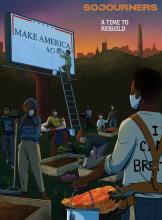2020 WAS A YEAR of ecological breakdown. Simultaneous climate disasters have roared, including the worst wildfire season in the history of California and, as I write this, the most active hurricane season on record in the Atlantic. Meanwhile, freak wind storms called derechos plagued the Midwest and heatwaves baked the Southwest. In the midst of such devastation, it can seem downright irresponsible to search for hope. Yet, the paradoxical call of the cross is that, in the deepest darkness, joyful and beautiful transformation might be possible.
In The Green Good News, T. Wilson Dickinson does not settle for platitudes of hope. He does not affirm, as is so tempting for Christians, that all will be fine because of faith in God. Instead, Dickinson finds good news in the possibility of a beautiful and joyful set of responses to ecological breakdown. With humble writing grounded in stories of his own life, Dickinson offers a reading of scripture that does not separate the liberation of creation from the liberation of the poor but follows the vision of Jesus, in whom all creation—human and more-than-human—holds together. In a refreshing move, The Green Good News sheds the romanticism of creation care in favor of a biblically based environmental justice from the margins. Dickinson unequivocally offers a call to conversion from neoliberalism to solidarity with all oppressed creatures. This ecological conversion takes place at the heart of the Christian witness: the table.
Read the Full Article

